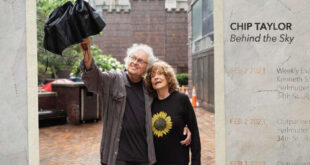“World music” became a common term only in the 1980s, usually denoting non-Western traditional music. But to paraphrase whoever said “It’s all folk music”: Since we’re all part of the same world, isn’t it all – Western chamber music included – “world music?”
Western composers have been adapting foreign traditional styles and using them in their own music for centuries. Romani (or “Gypsy”) folk music, predominantly from Hungary, has been an especially popular influence on the Western classics. That’s the focus of the next concert in the Aspect Chamber Music Series. On April 11 in New York City, pianist Per Tengstrand will perform Liszt’s iconic Sonata in B minor, then join three string players in Brahms’ Piano Quartet No. 1 in G minor. Both works embrace the sounds of Romani traditional music.
The 2023–2024 season of the Aspect Chamber Music Series then wraps up with a concert in London on April 18 and another in NYC on May 1. More on those below.
The Timeless Appeal of Romani Music
What drove Western composers’ great interest in Romani music? Mr. Tengstrand shared some thoughts with me on the subject.
“I think there was a fascination,” he said, “with the music of a people where music traditions had been taught through generations with no formal education in instrumental technique or composition. The music was alive in the truest sense; no performance was like any other, since there was no score.
“I also think the pain and suffering being heard in the music, expressing the persecution of the Romanis (Hungary was the place where they were treated comparatively well, hence why many lived there), spoke to many composers on both a musical and a human level. Painful emotion in music when expressed as directly as they are in Romani music, is incredibly powerful.”

The theme of the April 11 concert, titled “Alla Zingarese,” is specifically the influence of Hungarian Romani (“Gypsy”) music that’s discernible in both the Liszt Sonata and the Brahms Piano Quartet. But there’s an irony here: Brahms didn’t appreciate Liszt’s effort. In fact, he fell asleep on first hearing the Liszt Sonata.
The incident took place, Tengstrand said, “during Brahms’ tour with the violinist Eduard Reményi, regarded as the person who introduced Hungarian music to Brahms. Reményi was highly praised by Liszt for how he performed Gypsy music, and was even called ‘the Liszt of the fiddle.'”
Brahms’ snoozing “might have been a simple matter of Brahms being exhausted by travel,” the pianist speculated. “There is no denying he did not ‘get’ Liszt’s music, but I just have a hard time believing Brahms would deliberately be such a rude guest!”
Tengstrand agreed that “there is an ironic angle in this program.” But it’s one, he said, that “underscores the power of Hungarian music: Although incredibly different as musical creators, both Liszt and Brahms were fascinated, inspired and influenced not only by Gypsy music, but also by how it was played.”
Switching Gears
Mr. Tengstrand will bring more than his musicianship to the Aspect concert. He will also serve as a kind of master of ceremonies, giving the evening’s illustrated talk as well as performing in both works.
I was curious about what kind of change in mindset is needed to go from solo performance to chamber group in the same concert, as he will do, first playing the Liszt Sonata, then joining violinist Hana Mundiya, violist Katie Liu, and cellist Robin Park for the Brahms Piano Quartet.
“On a practical level,” he said, “there is the simple adjustment of how loud you can play. In all chamber music it’s important to know in what register the strings are playing, especially the viola, so you don’t drown them.
“While the solo piece makes me go into a private sphere (somewhat paradoxically shared with an audience), the chamber piece is a musically shared space, where we are all parts of something, hopefully and ideally where the whole is greater than the sum of its parts!
“With these young musicians,” he added, “I have played with them for years now and seen them grow, and I am so proud of their development. We have a lot of fun playing together.”
No doubt that positive feeling will rub off on the audience at the intimate Blue Gallery. (The venue successfully hosted its first Aspect concert in February.)
Art and Art Songs: Invitation to a Voyage

The following week, on April 18, the Aspect Chamber Music Series makes a long-awaited return to London with “L’Invitation au Voyage” at the Leighton House Museum. This concert will feature music for voice and piano by Debussy, Berlioz, Ravel, Duparc, Fauré, Martinů, Poulenc, and Weill, with an illustrated talk by Patrick Bade.
Soprano Vera Maria Kremers and pianist Jakub Sládek will be the performers in a program on the theme of travel on water, taking listeners through a century of French art and music.
Mozart as Harlequin

The 2023–2024 Aspect season then concludes May 1 at Bohemian National Hall in NYC. Pianists Michael Stephen Brown and Adam Golka will play a selection of Mozart pieces for two pianos and four hands, with an illustrated talk by Jan Swafford, author of much-lauded biographies of Mozart, Beethoven, Brahms, and Charles Ives.
The program, “Mozart as Harlequin,” explores Mozart’s wit, both musically and in his life outside music, to paint a portrait of the composer at his most high-spirited. In includes the D major Sonata for Piano Four Hands; some of Mozart’s hilarious and bawdy canons; and excerpts from notoriously crude letters he wrote to a girlfriend, all showing how Mozart was devoted to joie de vivre both as a man and as an artist.
Tickets for all three upcoming Aspect Chamber Music concerts, along with more information, are available at the Aspect website.
 Blogcritics The critical lens on today's culture & entertainment
Blogcritics The critical lens on today's culture & entertainment




